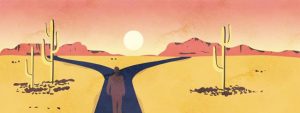
Art by Sefira Lightstone
A WEEKLY TORAH THOUGHT FROM RABBI MORDY
This week we begin the fourth Book of the Torah, the Book of Numbers, also called Bamidbar. Bamidbar is the name of the Parsha as well and, while the book overall is called “Numbers,” the word Bamidbar is actually translated to mean “in the desert.” It speaks of Moses counting the Jewish people (Numbers, get it?) and begins by describing the setting – it happened, obviously, in the desert. This also works for this time of year, since the holiday of Shavuot is fast approaching and this commemorates the giving of the Torah which happened in, wait for it, the desert! So there is obvious significance to the desert and lessons to be learned. One lesson that is appropriate as we celebrate the giving of the Torah is the desert as an ownerless wilderness. Why? Why was the Torah to be given, yes on a mountain, but in a vast desert? The answer is for that reason exactly. The Torah was not to be given in a certain specific locale which would give reason for its inhabitants to feel the “rights” to it. It wasn’t given in a city to be ideal for “city folk,” nor in the country for “country folk.” It was given in the desert, a place in which no one really dwells but people simply pass through. What is the lesson? The Torah is an everlasting guide book. The Torah is meant to guide and direct us through life regardless of where we may be at any given moment (how much more so during these unprecedented times!) such that it is eternally relevant for everyone. It was given in a desert, and therefore belongs to each of us equally. So, as we prepare for the giving of the Torah, let us try and take a lesson from this eternal guidebook and see how it may relate to us. The Torah is called “Torat Chaim,” the Book of Life; it is a living document and has lessons for each of us at any given moment. Let’s seek those lessons and can thereby live better, more goodly and more G-dly lives. Now more than ever, we need a news source we can trust! Good Shabbos!





